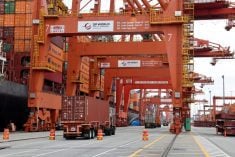A program that helps rural communities turn wood waste into heat for buildings and homes is being expanded throughout British Columbia’s Interior.
The province is partnering with the Columbia Basin Trust, the Southern Interior Beetle Action Coalition, the Omineca Beetle Action Coalition and the Cariboo-Chilcotin Beetle Action Coalition to invest $240,000 over two years in the Wood Waste 2 Rural Heat project.
Formerly known as the Green Heat Initiative, the expanded project will work at the local level to develop business plans that identify technological solutions and financing opportunities.
Read Also

Canadian trade data delayed by U.S. government shutdown
Canadian international trade data for September will be delayed indefinitely due to the ongoing partial shutdown of the United States government, Statistics Canada said Friday, Oct. 24.
In an area hit hard by the mountain pine beetle infestation, the projects will help create jobs while providing energy savings to the region.
Rural B.C. has a reliable fuel supply of wood waste produced by ecosystem restoration projects, community forests, woodlots and other small tenure holders.
“This initiative is like the 100 mile diet, but for energy. We’re bringing biomass heating to the next level in Interior communities by providing resources and information, and bridging the knowledge gap through education, outreach and community engagement,” said Rob Gay, general manager of Community Futures East Kootenay.
Converted into pellets and chips, the woody biomass can power heating projects for smaller communities and businesses, a practice being done in Europe. Leading the way is Austria, which reportedly has more than 1,100 biomass district heating plants in operation with an installed power base of roughly 1,300 megawatts.















